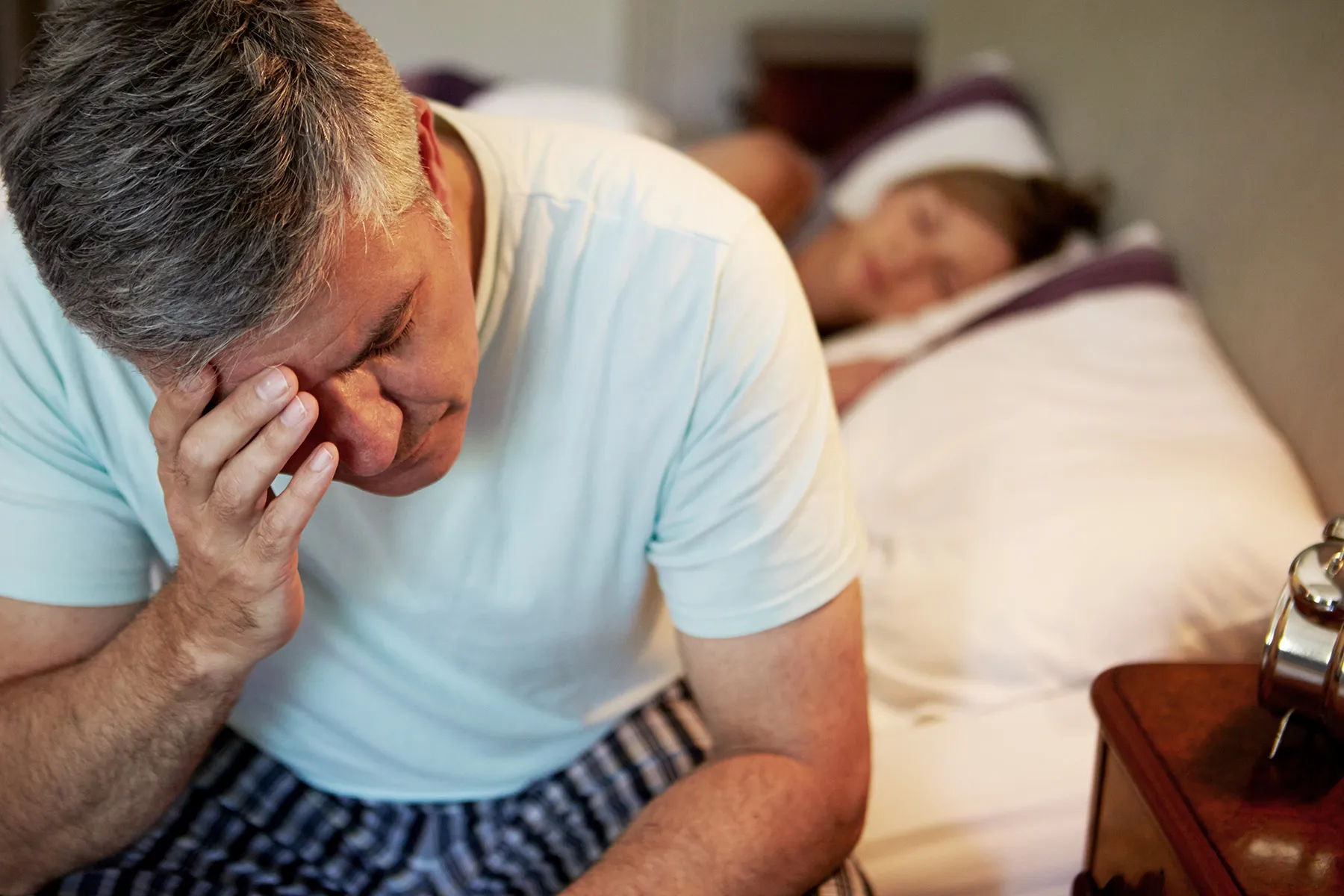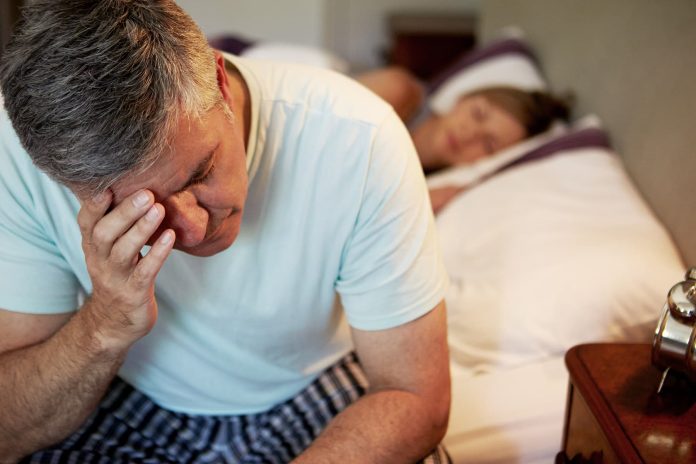
Aug. 8, 2022 – El-Ad Eliovson, a 56-year-old from Bergen County, NJ, wakes up many times each night from severe back and neck pain caused by multiple herniated disks.
Eliovson isn’t alone, according to a recent report from the Sleep Foundation. The report, based on an online survey of 1,250 U.S. adults, found that “painsomnia” (insomnia from chronic pain) keeps many people counting sheep at all hours of the night.
In fact, nearly 95% of respondents lost at least 1 hour of sleep because of pain during the past week, and 85 lost at least 2 hours of sleep every night. Over half of those surveyed who have regular pain (57%) wake up at least three times during the night.
Respondents who reported pain averaged about 6.7 hours of sleep per night, which is below the 7 to 9 hours recommended by the National Sleep Foundation.
“Pain can certainly worsen insomnia and disrupt sleep; but lack of sleep, in turn, can increase how much pain people experience,” says Alex Dimitriu, MD, founder of Menlo Park Psychiatry and Sleep Medicine and a member of SleepFoundation.org’s medical review board.
Back Pain Most Common
According to a 2018 CDC report, an estimated one-fifth of American adults (50 million people) have chronic pain, with over 7% saying they have “high-impact chronic pain” that limits life or work activities.
The CDC found that people deal with a variety of pains – most commonly back pain, followed by lower limb pain, upper limb pain, headache or migraine, or pain the belly, pelvis, genitals, teeth, or jaw.
Given that back pain is most common, it’s not surprising that the Sleep Foundation survey found that to be the pain most likely to wake people up. Out of everyone who said pain disrupts sleep, 57% said it was because of back pain, 41% from neck pain, and 32% reported having head pain.
Severe pain wreaks havoc on sleep. A fifth of respondents said they lost 2 hours of sleep in the past week, and over 17% said they lost upward of 10 hours.
Eliovson’s pain falls into the high-impact category, leaving him unable to work or carry out many daily tasks. “It’s impossible to describe how excruciating my pain is, and how it wrecks my sleep,” he says. “And not sleeping well makes an already hard situation even worse.”
But, says Dimitriu, pain does not have to be severe to disrupt sleep. Even mild pain can make you less able to fall asleep or remain asleep, and sleep quality may suffer when you’re in pain.
Pain Might Add to Sleep Disorders
People who have painsomnia are often diagnosed with sleep disorders. Of those who reported pain that interrupted their sleep at least 1 night a week, about one-third (32.7%) had been diagnosed with insomnia, almost a quarter (23.8%) said they had been diagnosed with sleep apnea, and one-fifth (21%) said they had been diagnosed with restless legs syndrome.
Eliovson has been diagnosed with sleep apnea, which is a disorder that causes people to stop and start breathing multiple times a night.
Being overweight is a risk factor for sleep apnea. “Because of my disability, I was unable to exercise; and because of the inactivity, I gained weight and developed sleep apnea,” Eliovson says. “I never fell into a deep sleep and didn’t dream for over a year.”
When he was diagnosed with sleep apnea, he received a continuous positive airway pressure (CPAP) device that pumps pressured air from a machine through a hose and mask worn on the face.
“After receiving the CPAP, I slept for 10 hours straight, 3 days in a row,” Eliovson recalls. “It’s as if my body was drinking up sleep. And I started to dream again.”
The Sleep Foundation encourages people who have sleep disorders to consult their health care professional and have the disorders treated. And treating sleep disorders will not only help sleep quality but may actually help with pain as well, Dimitriu says. “Optimizing sleep can actually improve pain both during the night and during the day, via improved sleep quality,” he says.
What Can Be Done?
Dimitriu says that any pain remedy, ranging from medications to physical therapy and even meditation, “also has the potential to improve sleep.” He notes that certain prescription medications, such as opioids and gabapentin, should be used with caution because they can “suppress breathing drive.”
The Sleep Foundation survey found that over half of respondents (55%) had sought care from a health care professional for their painsomnia. Most take some type of medication for their pain, either prescription (59%), nonprescription (54%), or a combination of both.
A large number of respondents (56%) had also tried sleep aids during the past month, with melatonin as a popular choice, used by 49% of respondents.
Eliovson takes an array of prescription medications, some long-acting (before bed) and some as needed during the night for breakthrough pain. But he also uses other approaches because “sometimes, medications are just plain inadequate,” he says.
He has tried to get the most comfortable mattress possible, but that hasn’t been successful because “the mattress turned out to be a piece of junk.” On the other hand, he bought a good pillow after “doing a lot of shopping,” and it has been “critical” in helping his sleep.
Eliovson has found heat wraps and lidocaine patches, and a topical ointment containing a blend of arnica, cannabidiol (CBD), and other herbs to be helpful. And he has received a prescription from a health care provider for medical marijuana, which has helped with pain and with sleep.
Although research says physical therapy and acupuncture can help people with pain and insomnia, Eliovson did not find that to be the case. He did try self-hypnosis and guided visualization (both recommended by the Sleep Foundation), which “helped to some degree but were not enough.”
Some studies also support the use of yoga for some types of pain and insomnia. Eliovson said that certain yoga stretches he learned from physical therapy have helped ease some of his pain, which improves his sleep.
Meaning and Connection
The Sleep Foundation survey found that close to one-fifth of people surveyed turned to pain-related support groups and, of those who did, 91% found they helped them manage, understand, or improve their sleep. Respondents found these groups through online searches or recommendations from family, friends, or health care professionals.
When able, Eliovson does religious studies with others and volunteers to help his rabbi with writing tasks. “This takes a hard situation and makes it meaningful,” he says.

We understand how important it is to choose a chiropractor that is right for you. It is our belief that educating our patients is a very important part of the success we see in our offices.
